Fishing in a Mid-West College TownThe Moraine Lake of Porter County . . . .
The following article concerning the lakes of Center Township and Liberty
Township appeared in the August 1919 issue of OUTING, an outdoor recreation
magazine.
Source Citation:
McIlrath, W. R. 1919. "Fishing in a Mid-West College Town," Outing
74(5):285-288.
Fishing in a Mid-West College Town
By W. R. McILRATH
PHOTOGRAPHS BY THE AUTHOR
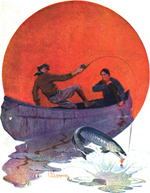
Showing that Valparaiso, Indiana, Has
Something Beside a "Poor Man's College"
FORTY miles southeast of Chicago lies the sleepy little town of Valparaiso,
Indiana. Its chief claim to its modest fame lies in the fact that it is the home
of Valparaiso University, famous since 1873 as "the poor man's college." S. S.
McClure and a great many other men who were once poor (but are not so poor now)
got their educational start in the world here. If all who have been benefited by
this modest institution should shout together in one voice it would remind the
hearer of the hallelujahs of Judgment Day, so great would be the demonstration.
But it is not of Valparaiso the sleepy, Mid-West college town, or the college
itself, "with opportunity written over its door," that we are to tell you here
(that is only to locate our article on the map), but of the fishing there is to
be had in a country that has never been exploited and where none is suspected to
exist by the outside world.
In the age when glaciers covered a large part of the earth, that part of Indiana
which lies in the vicinity of Valparaiso was on the edge of the glacial belt.
Southward the ice did not go. But to the north of the little city the ice and
rocks ground out great holes in the earth, the beautiful scars of which remain
to this day in the form of a chain of glacial lakes extending up toward Lake
Michigan to the northwestward of the town.
The surprising thing about these lakes is that they are so deep, lying, as they
do, in a flat or gently rolling country. Some of them have springs in their
bottoms and the water is at all times fresh and pure. The city of Valparaiso
drinks it, and uses it for its cooking, if any proof be needed. The largest and
most famous of these is Flint Lake, which lies
just three miles north of Valparaiso, on the Gary & Interurban electric line,
and on a macadam auto road. This lake contains about 5oo acres and is over 80
feet deep in its deepest part. Judged by its size, it is not so abnormally deep
as some of the little round pot holes near it. On its eastern shore is Sheridan
Beach, a beach of sand, narrow and shelving, under a bluff of ancient oaks. It
is here that the hotels, dancing pavilion, boat house, and most of the cottages
are.
There was a time when Flint was a famous bass lake, second only to Lake
Maxincuckee in Northern Indiana, but of recent years the fishing has been
permitted to run down, through hard fishing and failure to restock it
adequately. Its chief claim to attention lies in the fact that it is the
largest, the most sightly, and the most convenient of "the big four." By far the
largest summer colony camps on its shores. And there are some bass for the
persistent fisherman. But the knowing fisherman goes elsewhere, to less noble
and less exploited, lakes.
About two hundred yards to the northward of the west end of Flint, and connected
with it by a flowing stream, is Long Lake, so called because of its shape. It is
about a mile long; its shores are more irregular than those of any of the other
lakes; and it is, next to Wahob, the most famous bass lake of them all. It is
comparatively shallow and has many little coves and nooks of shallow water full
of lily pads where the big fellows love to lie. Its maximum depth is probably
not far from twenty feet.
Beyond Long Lake, connected again by a narrow channel (this time a much shorter
one), is Canada Lake, a small oval lake of ten or fifteen acres. As a bass lake
it is reputed to be about in the same class with Long Lake.
Beyond Canada lies Wahob, the last of the "big four" an oval lake of great depth
and the most famous bass lake of them all. Reason: Mr. Isaac Dillingham, its
owner, stocks it every year. Also it is probably not fished so hard as the
others. On the west shore of Wahob, and between it and the car line (about 100
yards away), is an almost perfectly round knob of a hill that rises high above
the lake and is much used by picnic parties and for Fourth of July celebrations.
Wahob has a narrow belt of lily pads clear around, but this belt is only a few
yards wide. The shores shelve rapidly into deep water. The owner asserts that it
is a deeper lake than Flint.
Besides the "big four" there are several smaller lakes and glacial pot holes.
The one nearest to Valparaiso, being between Valparaiso and
Flint Lake, is called The Bulls Eye. This is an
insignificant looking pond in a perfectly flat country. It lies by the side of
the road, and the average auto tourist would pronounce it as being probably four
feet deep in the middle. Yet it is nearer forty. It is about forty yards across
and almost perfectly round, hence the name, "The Bulls Eye."
To the westward of Flint lies a little, double lake, called Spectacle Lake.
(Shape of a pair of spectacles.) To the westward of Long Lake, just over the
hill which lies between them, is another bulls eye lake, only this one takes the
name of Deep Lake. It is about five acres in area and almost perfectly round,
and is said to be fifty feet deep. All these lakes and pot holes to the northward of Valparaiso are of glacial origin.
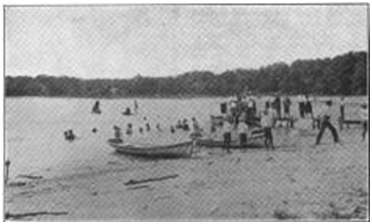
Noisy bathers do not disturb
the bass when there is a ripple in the water.
Sheridan Beach, Flint Lake
Just outside the city limits to the southward lies Sagers, beloved of the
students of the university. On its precipitous wooded snores are myriad paths
known to lovers' feet, and in the deep gorges running down to it from the south
side the very earliest spring flowers bloom.
When the first warm winds come out of the South chasing the snow off the hills
and bringing the first soft odor of spring, if one will look under the dry
leaves in these deep ravines running down to Sagers, he will find the tender
young flowers pushing up out of the ground. This is a spot after the heart of
John Burroughs if he could but have seen it. And on the more open hills, covered
with white clover, stand clumps of sumac and crab apple trees.
Where Sagers Lake now lies was once a deep narrow valley through which flowed a
tiny stream. In the days when flour and meal were ground by water-power, a dam
was thrown up across the lower end of the little valley and a water-mill
erected. This old water mill still grinds the grist and lends an atmosphere of
romance and mellow age to the vicinity.
Next to the dam the water is about forty feet deep, growing shallower,
gradually, toward the upper end, over a quarter of a mile away as the crow
flies. There are said to be springs in the bottom of Sagers also. Be that as it
may, there are certain parts that are very slow to freeze over in winter.
In the upper end spatter dock grows in clumps on the surface and forms an ideal
feeding ground for the big bass which inhabit the lake, for Sagers is more noted
for the size of its black bass than their numbers. When you catch one it is
generally a good one. But of strawberry bass, sunfish, crappie, and other like
fish there is seemingly no end. Hence the bass grow big, feeding on the young of
these. Even the "college widows" can land a string of these any time.
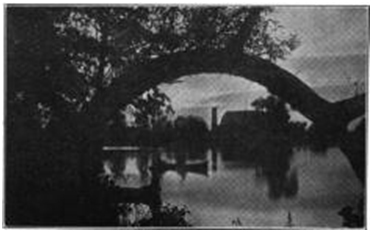
The Rainbow Willow by
moonlight at Sagers
At the foot of the wooded bluff on the south side of the lake is the famous
"Rainbow Willow" known to generations of collegians. Also it is known to every
fisherman in, or around, Valparaiso. Leaning far out over the lake in a majestic
arch, and framing a picture of the romantic, old mill against the sunset, it has
made more money for George Eastman, perhaps, than any tree extant — not even
barring that famous Sequoia through which the carriage road, runs. Be that as it
may, thousands of films have been expended upon it by generations of students
and tourists.
About the time the dandelions star the pastures and the crab apple trees on the
hillsides are in bloom, the germs of the fishing fever are thick in the air in
Valparaiso. Likewise in Gary and some other towns, not to mention Chicago. Once
a man becomes inoculated he must, perforce, go.
The local fishermen get out their long cane poles from the garage or woodshed
and dig the minnow bucket out of the junk under which it lies buried. The
casting enthusiast overhauls his equipment and pores over new catalogs, studying
the newest outrageous contraptions, for the moment forgetting that the
indispensable trio will do the work if the bass are inclined to bite; and that,
unless they are, nothing much will help him. The trio consists of one good
underwater bait, one weedless surface bait, and a pork rind. If a fourth be
added, then a luminous bait for night fishing.
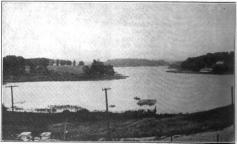
View of Long Lake
I know fishermen who have cottages on Flint and have the walls adorned with bass
"bugs" and minnows of all kinds. In fact, some of the cottages resemble tackle
stores, and it is all very well if a man is so inclined and takes a pride in his
"collection," but a man who understands all there is to understand about bass
will catch about as many fish with half a dozen or so lures.
After spring has made two or three false starts, and finally arrives, every
caste of fisherman may be seen wending his (or her) way toward Sagers. (That
being the nearest lake to town. The others are left to the discriminating
fishers, and to those who have autos.) The urchin with dirty face, and a rusty
can full of worms, and a weather beaten cane pole (now the color of a steel-gray
battleship), steals down along the Nickle-plate Railroad. The man and his family
off duty for a week-end go down together. A greasy mechanic with a cheap steel
rod and a $3 reel but with a lot of bass information in his head, goes as
straight as an arrow flight, and grins as he meets you.
Now and then a well-to-do caster with "a regular outfit "goes to Sager's but
most of these go to Long Lake or Wahob. But the multitude is made happy; the
"boss" of the lake rents all his boats; and everybody has a great time. Long
strings of beautifully speckled and tinted pan fish come in at evening. And a
real bass fisherman will bring in "a gentleman's string" of bass.
The best time to catch fish on Sagers is in the early summer mornings. This is
an obvious truth that applies to any lake where many people are on it all
through the day and late into the night. But there are very few "early birds"
even if the late ones be numerous. If one has the heroism to get up about the
time the ice man is making his rounds he can catch bass on most any lake in the
country. It matters little how disturbed the lake will be at any other time of
the day. At this time of the morning practically any lake in the country is
quiet. No charge for the tip to those who feel they cannot afford a trip to
Canada or elsewhere after bass.
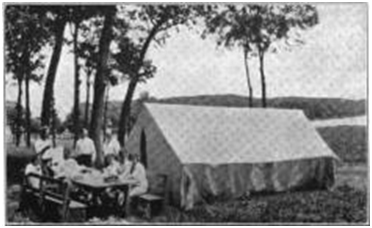
The green pastures around
Flint are full of ideal camp sites
In the evenings, on Sagers, rowboats ply to and fro bearing giggling boats lurk
in the dark corners where grandfather bass are wont to lie. One is as liable to
fasten the hooks of his artificial minnow in a gauzy shirtwaist as in the jaws
of a fighting bronzeback. In either case there one might be called upon to lick
the fighting umpire of the local games. I have generally considered that most
too much of a sporting proposition, even for me. A minnow bearing five treble
hooks would sure tangle up some in a gauze shirtwaist.
Yet, after the "tumult and shouting" have died, in the warm half-light or early
mid-summer mornings, if the fisherman will steal down a path I know along a
white-oak ridge, and launch a boat upon the mist-covered lake he will be in
direct line for piscatorial sport undreamed of when the lake is seen in the busy
action of the day. Big rings break the surface like the explosion of miniature
depth bombs. Through the mist comes the well-known "plop" of feeding bass.
Sometimes an immense submarine explosion rolls the water almost at the side of
the boat. Through the fog, all about, "plop!" "splash! " they go.
The rings travel across the lake the morning is over it all. The summer woods
are waking to life. A squirrel is noisily barking off there in the woods. Early
birds have begun to twitter and get restless. Yet, in the main, it is very warm
and still.
Much of the charm of early summer mornings, before the sun has risen, lies in
the consciousness of abundance of life present and very close, even if there is
no sound. Also the consciousness that it will soon break into vociferous
activity when the sun comes up, a red disk, over the hills to the east.
Casting along the weed beds at the mouths of the ravines where the early flowers
grow, it is remarkable if one of the dozen or so casts is not met by a "boil"
and a strike. Casting here is tempting the gods which preside over fishy destiny
in a manner which seldom goes unchallenged. One need feel no surprise at this
point when he finds himself vibrations of which race up the taut line and
quivering bamboo to his excited and ecstatic nerves. Finally when a four or five
pound bronzeback lies in the bottom of the old scow there is an immense sense of
relief and the consciousness of the fact that the woods have waked to life. The
sun is up and the mist rising from the water.
Two fox squirrels are chasing each other on an old oak den-tree. Crows are
calling noisily and starting their flight. A kingfisher is flying up and down,
occasionally uttering his peculiar cry. A muskrat swims across the quiet upper
end of the lake, leaving a wake like a miniature steamer. A school of
fingerlings dash away as the boat approaches a fallen and sunken tree.
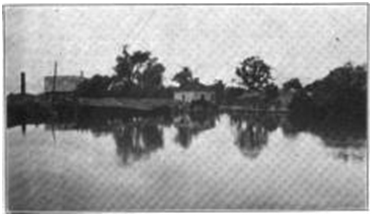
An ancient mill, still
operated by water power, lends an atmosphere of
Romance to Sagers. Boat landing in the middle distance
The weeds on the bottom, in the clear amber water, now are to be seen in all
their beauty. Perhaps only a moment ago a great bass lay among them. Perhaps you
catch a glimpse of him leaving. It is such observations and speculations as
these that lend fascination to the 'nth power to a morning next to Nature's
heart, even if it is less than half a mile from a busy county-seat town.
The rings of all the breaks are now distinctly visible as fast as they are made.
Casting in the spatter dock at the east end with a weedless minnow or bug will
bring a fair percentage of strikes. On a high promontory above the very
narrowest sand beach is the white tent of a camper, the smoke ascending in a
thin spiral from the ends of two chunks from his burned-out camp-fire. He is one
of the late birds, too. At this moment he is dreaming and missing the best
fishing hours. All is as .quiet as the tomb about the tent.
That is more than half the fun of fishing in the midst of a busy tourist
population, this getting out and catching "a gentleman's string" where it is not
supposed to be possible; this beating the other fellow to it; this making the
most of comparatively narrow chances. But it is possible to catch "a gentleman's
string," and what more does any one want? Granted a sufficient measure of skill,
first-class tackle, a knowledge of bass nature (so far as it is possible to know
that), and an appreciative mind, and no greater wealth in this department of
endeavor can be bestowed. It represents the peak of fishing efficiency.
But now let us consider the glacial lakes to the north of town. Of these, Flint
is the lake of the summer cottagers. Half way around Flint is an almost solid
bank of cottages. On the high east shore stands a rather pretentious hotel;
dancing pavilion, boat house, and "all extras." However, on the west and south
shores there is plenty of room for tents and a measure of privacy. The pastures
are very cool and green on the hot summer evenings.
On week-ends Flint is a very busy place. In the middle of the week, (when no one
can get off), it is relatively quiet. Such fish as are caught are generally
caught at such times, although bass have struck almost in the midst of shouting
and splashing bathers.
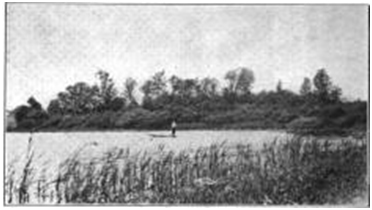
In the nooks and corners of
all the lakes the big fellows lie
But ye informed angler goes to Long Lake, Canada, or Wahob. Long Lake affords
lots of fishing territory, and working on the theory that he who throws the
javelin all day must hit sometimes, it is a good bass lake. From any angle it is
a much better lake than Flint. And Canada is about on a par with it. There are
relatively few summer cottages and hotels and the fishing isn't so crowded.
However, the early morning stunt works best here, too. Take the first electric
train out of Valparaiso in the morning.
Just over the hill from Long Late is an enlarged "bulls eye" called Deep Lake.
It has a surprising bass population. Though the lake contains only about five
acres, personally, I would as soon take my chance for a string on those five
acres of water as Flint Lake's five hundred. Just
outside the weeds of the shore line, in about twenty or twenty- five feet of
water one can sometimes hook a whole school of sunfish or crappie.
The territory is not so immense that if a school be in the lake and be moving
they cannot find the fisherman and his hook. The smaller lakes are not given so
much attention, hence they often prove veritable fish "pockets" to the informed
angler. But when all is said and done, Wahob is "the one best bet." Its owner,
Mr. Dillingham, stocks it, and protects it, and generally takes care of it, with
the object in mind of making it a fish lake rather than summer resort. In its
deep, clear waters there are big bass, and numerous. It probably covers less
than forty acres but it is the best fish lake anywhere around Valparaiso.
In a general way there is good fishing at any time of the day. The outlook from
the hill next to the car line is beautiful. It is the lake for the man whose
taste runs to fishy excitement rather than to the excitement of the thronged
resorts. It is a lake after the heart of Walton.
Transcribed by Steven R. Shook